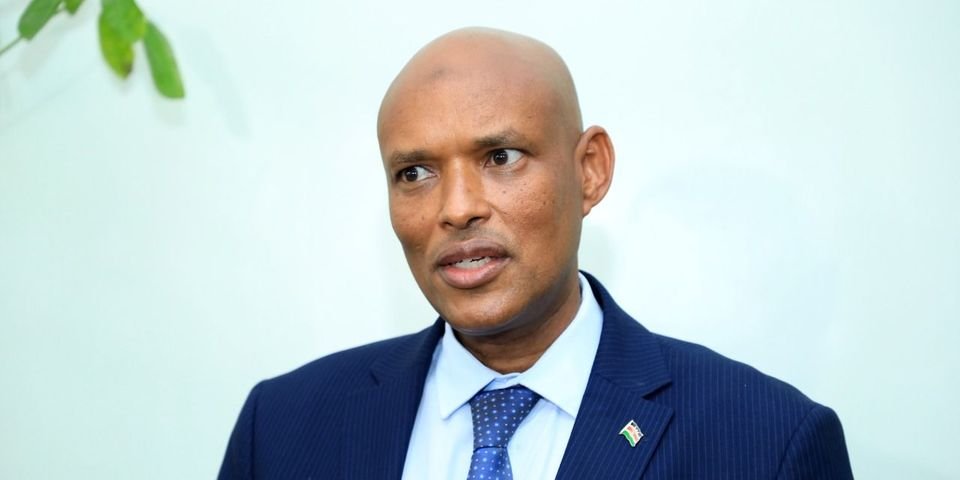An impressive CV and a scandal-free career spanning decades as an investigator and manager earned Internal Affairs Unit (IAU) chief Amin Mohamed Ibrahim the selection as the next Director of Criminal Investigations (DCI), replacing George Kinoti who resigned last month.
President William Ruto yesterday morning gazetted the former head of the Banking Fraud Unit as the new DCI after he beat nine other candidates during marathon interviews conducted by the National Police Service Commission (NPSC) on Monday.
“In exercise of the powers conferred, I, William Ruto, appoint Amin Mohamed to be the director,” stated the President.
Mr Ibrahim, 58, has been in the National Police Service for the last 33 years, serving in various capacities. That made him a clear favourite from the time a shortlist of 10 candidates for the position was released by NPCSC last week.
He will, however, be going back to a familiar ground. He first cut his teeth on investigations when he was appointed the officer in charge of the crime branch at Bungoma Police Station immediately after being hired as a cadet in 1989.
Apart from various stints at the DCI where he rose through the ranks, Mr Ibrahim successfully investigated former Deputy Chief Justice Nancy Baraza when she threatened a security guard in 2012, investigated and prosecuted the killers of former Italian bishop Luigi Locati in 2005 and coordinated investigations for the 2007 post-election violence.
He has also served as the director of the Kenya National Focal Point on Small and Light Weapons; as the regional director for the Directorate of Criminal Investigations (DCI) in North Eastern; as the head of investigations at DCI; as the senior superintendent at the Anti-Corruption Police Unit; among other senior positions
Yet, despite his good performance during the interviews where he scored the highest points, there was a push between certain political actors who wanted to impose their own candidate. But President Ruto stood firm, insisting that the person who won the interviews should be given the job.
Mr Ibrahim who comes into office as the 16th head of the investigative arm of the National Police Service since the formation of the Criminal Intelligence Unit (CIU) in 1926, is also the first director ever to be competitively recruited, an early positive change by the Ruto administration.
Despite existing provisions in the law on how the director of Kenya’s biggest investigative agency is supposed to be selected, the Mwai Kibaki and Uhuru Kenyatta regimes hired their DCI directors as Presidential appointees.
Section 30 of the National Police Service Act says: “Whenever a vacancy occurs in the office of the Director of Criminal Investigations, the (NPSC) shall, by notice in the Gazette and at least two daily newspapers of national circulation, declare a vacancy and request for applications.”
Yet Mr Kinoti, who came into office in 2018 as the 15th head of the DCI after it replaced the Criminal Investigations Department (CID) thanks to the 2010 Constitution, was appointed by President Kenyatta.
His predecessor, Mr Ndegwa Muhoro, was also appointed directly by President Kibaki on the eve of the promulgation of the 2010 Constitution, a move legal observers thought was meant to circumvent the law.
Mr Ibrahim’s appointment as DCI has therefore given the department a much-needed breath of fresh air after a tumultuous four-year reign of Mr Kinoti that began with a lot of promise, only to get mixed up with political battles. The appointment also gives the directorate a chance to bring itself back on track.
“His vast experience in the field of investigations within and outside the directorate will without doubt inject new blood to the country’s foremost investigative agency and address the ever-changing crime dynamics,” said the directorate following Ibrahim’s appointment as its head as it welcomed him “back home”.
As DCI boss, Mr Ibrahim will be one of the most powerful people in the country. He will be in charge of the Special Crime Prevention Unit, Banking Fraud Investigations Unit, the Anti-Narcotics Unit, the Bomb and Hazardous Disposal Unit, the Anti-Terrorism Police Unit, the Cybercrime Investigation Unit, among others.
During Mr Kinoti’s term, the DCI increased its visibility among Kenyans, upgraded the Criminal Intelligence Unit to Criminal Research and Intelligence Bureau, expanded the homicide (DNA, Toxicological, Chemistry and Biology Lab Units) and commissioned the forensic laboratory that had stalled for years.
Mr Kinoti, however, left office with a significant number of unsolved murder cases and a failed war on corruption which put him at logger heads with the Director of Public Prosecutions (DPP) Noordin Haji and President Ruto’s allies who accused him of targeting them.
This is where Mr Ibrahim – who is known among his colleagues as a media-shy, talented, fair but firm investigator with a love for reading – is expected to pick up from. He will, however, be walking on eggshells from the time he walks into the corner office at Mazingira House along Kiambu Road, with his first challenge being how to investigate cases involving politicians.
The Ruto administration whose members came under fire during Mr Kinoti’s tenure has already drawn the line on how it wants its members to be treated by the DCI. A number of politicians allied to the president have ongoing corruption and criminal cases in court where investigating officers from the DCI are expected to testify.
Additionally, Deputy President Rigathi Gachagua, who has never hidden his dislike for the DCI since he was arrested on suspicion of money laundering in 2019, has on many occasions expressed his displeasure at how the department operates. His preference is that sleuths should stay at Mazingira House instead of lurking in government offices.
His latest jab towards the directorate came two weeks ago when he said it is time to overhaul DCI operations.
“We want a professional DCI, who will not spend time on drama, who will not spend time on the press, told Citizen TV. By Vincent Achuka, Nation






